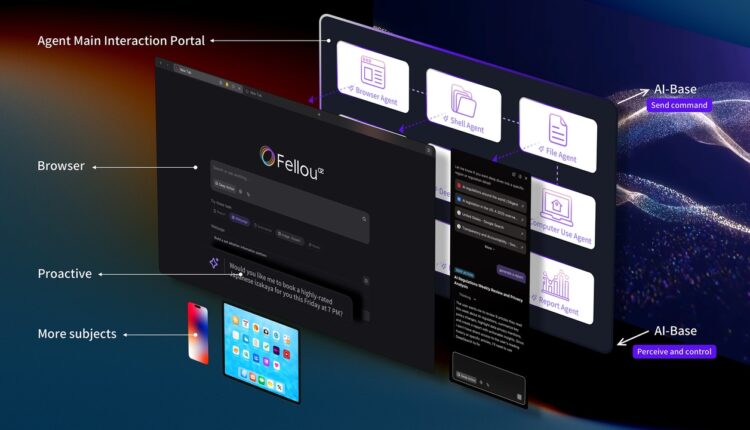The tech world is witnessing a major shift as Fellou introduces its Concept Edition (CE), the world’s first agentic AI browser designed to execute complex web and desktop tasks autonomously. This Silicon Valley startup is moving past traditional chatbots to create an AI-powered browser that acts as a true digital partner.
Beyond Simple Chat Functions
Fellou’s founder and CEO Dominic Xie challenges the conventional approach to AI productivity. Rather than focusing on time-saving metrics, Xie positions their agentic AI browser as a “cognitive lever” that expands human thinking and problem-solving capabilities.
“Measuring AI by minutes saved just makes us run faster on the same treadmill,” Xie explains. The real value lies in AI’s power to transform how people think, create, and tackle complex challenges.
Solving Modern Digital Complexity
Today’s knowledge workers face a paradox of productivity. Simple tasks like creating competitive analysis reports require navigating multiple tabs, applications, and manual processes. Fellou’s agentic AI browser addresses this inefficiency by understanding user intent and taking autonomous action.
The platform allows users to issue commands like “Analyze my LinkedIn profile and find 10 suitable Head of Product roles in San Francisco, then apply with the tailored resume on my desktop.” The AI agents handle the entire workflow autonomously while providing real-time control for user intervention and approval.
Technical Innovation Through Three Pillars
Fellou builds what it calls a “Seamless Continuum of Experience” through three core components:
Interaction Continuum enables natural dialogue where users can say “Organize last week’s research materials” and the agentic AI browser automatically accesses browser history, cloud notes, and local files without manual input.
Task Continuum manages goal-driven workflows, transforming the AI from a reactive tool into a proactive collaborator that breaks down complex objectives into manageable steps.
Memory Continuum creates a unified memory layer that connects browser cache, AI chat logs, and note applications into what Fellou calls “Agentic Memory” – essentially a digital mind map.
Market Performance and Adoption
The agentic AI browser has already attracted over 1,000,000 users, demonstrating strong market demand for execution-focused AI tools. Fellou’s Eko 2.0 automation engine achieves an 80% success rate on the complex Online-Mind2web benchmark, significantly outperforming competitors.
This early traction suggests users are seeking tools that actually remove work layers rather than adding another chat interface.
Building an AI Ecosystem
Xie’s vision extends beyond creating a better browser to fostering an entire ecosystem for agentic AI. The company plans to launch Agent Studio, a marketplace where developers can build, share, and monetize specialized AI agents.
“We’re building a platform for distributed intelligence,” Xie states. The goal is enabling everyone to operate across multiple domains with capabilities once reserved for rare geniuses.
Privacy remains central to this vision, with Fellou championing a local-first, on-device execution model that keeps sensitive data on users’ machines.
New Features in Concept Edition
Fellou CE introduces several enhancements to deepen the agentic AI browser experience. Agentic Memory forms the backbone of the Memory Continuum, while Transparent Sparks Usage provides upfront estimates of credits needed for complex actions.
Scheduled Task Execution allows users to automate recurring digital tasks, further reducing manual workload.
The Future of Human-Computer Interaction
Xie believes the best human-computer symbiosis occurs when AI helps people reclaim focus and pursue ambitious ideas. This vision positions the agentic AI browser as a vessel for a new renaissance in human creativity.
The company sees the market evolving from conversation to execution, moving past the “hello, world” moment of mainstream AI chat toward the “get to work” phase of agentic AI.
Fellou CE is now available for download, marking a significant step toward transforming how people interact with digital tools and accomplish complex tasks online.


